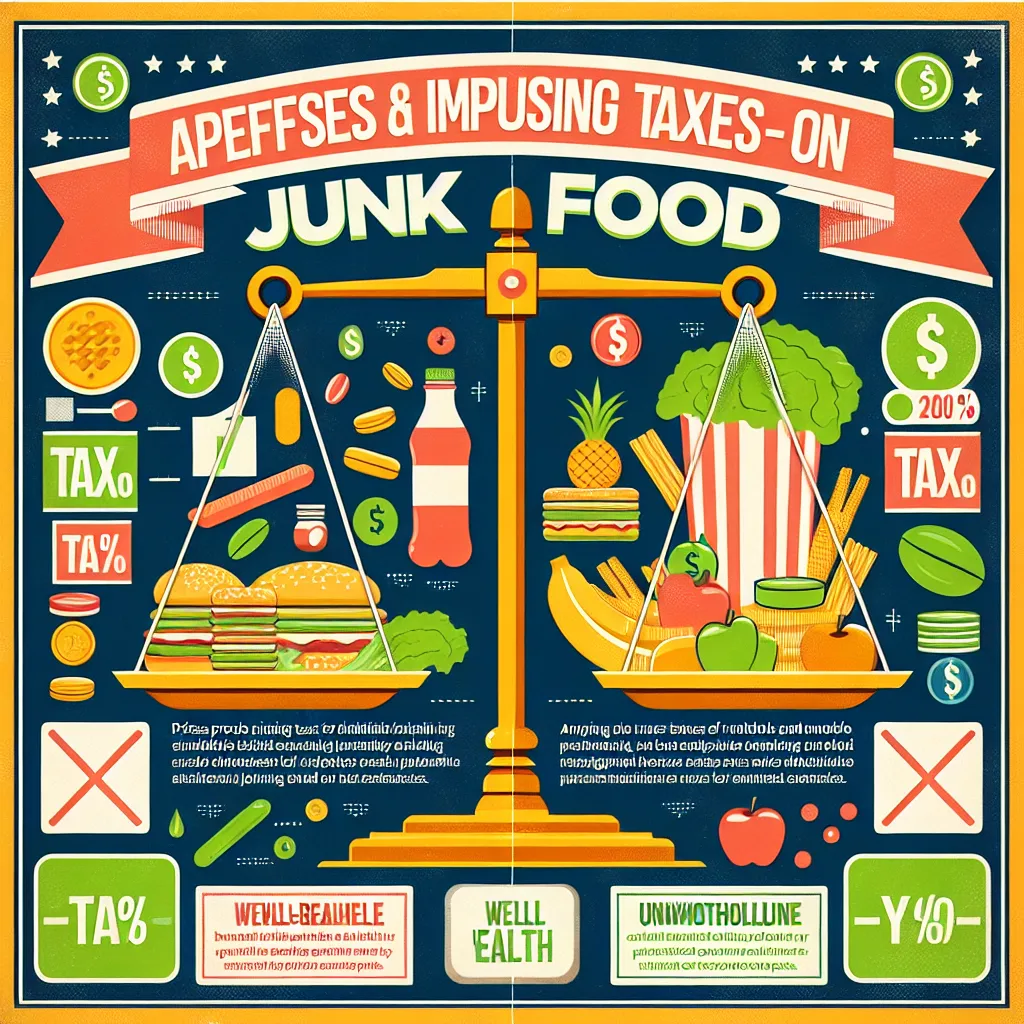The topic of whether governments should impose higher taxes on fast food has been a recurring theme in IELTS Writing Task 2 exams. This issue has appeared in various forms over the years, reflecting its relevance to public health and economic policy. Based on past trends and current global concerns about obesity and nutrition, it’s highly likely that this topic will continue to be featured in future IELTS exams.
Let’s examine a specific question that has appeared in recent IELTS tests:
Some people think that governments should increase the tax on unhealthy foods to encourage people to eat more healthily. Others think there are better ways to promote healthy eating. Discuss both views and give your own opinion.
Analysis of the Question
This question requires candidates to:
- Discuss the view that increasing taxes on unhealthy foods can promote healthy eating
- Explore alternative methods to encourage healthy eating habits
- Provide their personal opinion on the most effective approach
The task involves comparing and contrasting different viewpoints, evaluating their effectiveness, and forming a well-reasoned conclusion.
 IELTS Writing Task 2 Fast Food Essay
IELTS Writing Task 2 Fast Food Essay
Sample Essay (Band 8-9)
In recent years, the debate over government intervention in dietary choices has intensified, with some advocating for higher taxes on unhealthy foods as a means to promote better eating habits. While this approach has its merits, others argue that there are more effective ways to encourage healthier lifestyles. This essay will examine both perspectives and argue that a multifaceted approach, including education and improved access to healthy options, is likely to be more successful than taxation alone.
Proponents of increased taxation on unhealthy foods argue that financial disincentives can effectively discourage consumption of these products. They contend that higher prices would make fast food and sugary drinks less appealing, particularly to price-sensitive consumers, thereby reducing overall intake and potentially improving public health. Moreover, the additional revenue generated from these taxes could be redirected towards health initiatives or subsidies for healthier food options, creating a positive cycle of health promotion.
However, critics of this approach point out several limitations. Firstly, they argue that such taxes are often regressive, disproportionately affecting lower-income individuals who may have limited access to affordable healthy alternatives. Secondly, the effectiveness of these taxes in changing long-term eating habits is questionable, as consumers may simply absorb the cost or find alternative unhealthy options. Instead, these critics propose alternative strategies such as comprehensive nutrition education programs, improved food labeling, and initiatives to increase the availability and affordability of healthy foods in underserved areas.
In my opinion, while taxation can play a role in discouraging unhealthy eating habits, it should be part of a broader, more holistic approach to promoting public health. Education is crucial in empowering individuals to make informed choices about their diet. This could include integrating nutrition education into school curricula, launching public awareness campaigns, and providing resources for meal planning and cooking skills. Additionally, governments should focus on making healthy foods more accessible and affordable, particularly in low-income areas, through initiatives such as community gardens, farmers’ markets, and subsidies for fresh produce.
In conclusion, while increasing taxes on unhealthy foods may have some impact, a comprehensive strategy that combines education, increased access to healthy options, and targeted economic incentives is likely to be more effective in promoting long-term, sustainable changes in eating habits. By addressing the root causes of poor nutrition and providing individuals with the knowledge and resources to make healthier choices, governments can create a more equitable and impactful approach to improving public health.
(Word count: 398)
Sample Essay (Band 6-7)
The question of whether governments should raise taxes on unhealthy foods to promote better eating habits is a topic of much debate. While some people believe this is an effective strategy, others think there are better ways to encourage healthy eating. This essay will discuss both views and give my opinion on the matter.
Those who support higher taxes on unhealthy foods argue that it can discourage people from buying these products. When fast food and sugary drinks become more expensive, people might think twice before purchasing them. This could lead to a reduction in the consumption of unhealthy foods and potentially improve public health. Additionally, the extra money from these taxes could be used to fund health programs or make healthy foods cheaper.
On the other hand, critics of this approach believe there are more effective ways to promote healthy eating. They argue that education is key to changing people’s eating habits. By teaching people about nutrition and the benefits of a healthy diet, individuals can make better choices for themselves. Another suggestion is to improve food labeling so that people can easily understand what they are eating. Some also propose making healthy foods more available and affordable, especially in areas where access to fresh produce is limited.
In my opinion, while increasing taxes on unhealthy foods might have some positive effects, it is not the best solution on its own. I believe a combination of approaches would be more effective. This could include better education about nutrition, improved access to healthy foods, and some financial incentives to choose healthier options. By addressing the issue from multiple angles, we can create a more comprehensive strategy to improve eating habits.
To conclude, although taxing unhealthy foods may play a role in promoting better nutrition, I think a more balanced approach that includes education and improved access to healthy options is likely to be more successful in the long run. By giving people the knowledge and resources to make healthier choices, we can create lasting changes in eating habits and improve overall public health.
(Word count: 332)
Important Notes for Writing
-
Structure: Both essays follow a clear structure with an introduction, body paragraphs discussing different viewpoints, and a conclusion. The Band 8-9 essay demonstrates a more sophisticated organization of ideas and smoother transitions between paragraphs.
-
Vocabulary: The Band 8-9 essay uses a wider range of vocabulary and more precise language. For example, “financial disincentives,” “regressive,” and “multifaceted approach” show a higher level of lexical resource.
-
Grammar: Both essays use a mix of simple and complex sentences. The Band 8-9 essay demonstrates more varied and sophisticated sentence structures, such as “By addressing the root causes of poor nutrition and providing individuals with the knowledge and resources to make healthier choices, governments can create a more equitable and impactful approach to improving public health.”
-
Task Response: Both essays address all parts of the question, but the Band 8-9 essay provides more detailed and nuanced arguments, showing a deeper understanding of the issue.
-
Coherence and Cohesion: The Band 8-9 essay uses more sophisticated linking words and phrases, creating a more cohesive argument. The Band 6-7 essay is also coherent but uses simpler linking devices.
Key Vocabulary to Remember
- Dietary choices (noun phrase) – /ˈdaɪətəri ˈtʃɔɪsɪz/ – decisions about what to eat
- Intervention (noun) – /ˌɪntərˈvenʃən/ – the action of becoming involved in a situation to improve it
- Multifaceted (adjective) – /ˌmʌltiˈfæsɪtɪd/ – having many different aspects or features
- Regressive (adjective) – /rɪˈɡresɪv/ – taking a proportionally greater amount from those on lower incomes
- Disincentive (noun) – /ˌdɪsɪnˈsentɪv/ – a factor that discourages a particular action or behavior
- Holistic (adjective) – /həʊˈlɪstɪk/ – characterized by the belief that the parts of something are connected and should be considered as a whole
- Empowering (adjective) – /ɪmˈpaʊərɪŋ/ – giving someone the authority or power to do something
- Comprehensive (adjective) – /ˌkɒmprɪˈhensɪv/ – including or dealing with all or nearly all elements or aspects of something
- Sustainable (adjective) – /səˈsteɪnəbl/ – able to be maintained at a certain rate or level
- Equitable (adjective) – /ˈekwɪtəbl/ – fair and impartial
In conclusion, the topic of government intervention in dietary choices through taxation is likely to remain relevant in IELTS Writing Task 2. Future questions might explore related themes such as:
- The role of food companies in promoting healthy eating
- The effectiveness of public health campaigns in changing dietary habits
- The impact of food labeling on consumer choices
- The relationship between socioeconomic factors and access to healthy food
To practice, try writing your own essay on the given topic or one of these related themes. Share your essay in the comments section for feedback and discussion with other learners. This active practice is an excellent way to improve your writing skills and prepare for the IELTS exam.


